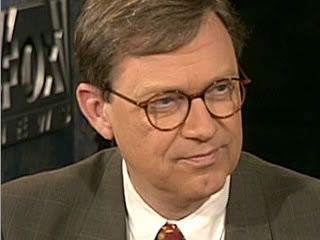Barone On 2008
 I got a chance to hear Michael Barone, US News political reporter and Fox analyst, this morning at Chapman University's "The Road to the Presidency" series and thought I'd pass on the notes I typed into my Blackberry, since I had neither a computer or a pad of paper handy.
I got a chance to hear Michael Barone, US News political reporter and Fox analyst, this morning at Chapman University's "The Road to the Presidency" series and thought I'd pass on the notes I typed into my Blackberry, since I had neither a computer or a pad of paper handy.He started with a laugher about being used to starting his speeches after invocations, but it was actually kind of nice not having "G*d damn America!" as your lead-up phrase.
As he covers this campaign, he feels for the first time that all the old rules broken have been broken and that it's a new period of politics he refers to as "open field politics," which replaced the trench warfare politics that reigned from Gingrich through the bombing of the Al Askariya shrine in Samarra in 2006.
"There hasn't been open field politics in DC since the 1880s, and now that Strom Thurmond is no longer there, there's no one that remembers them."The man's ability to remember political stats is nothing short of God-given; there's nothing naturally human about it. Joel Kotkin, who introduced him, said that driving across the country with Barone is an amazing experience because he knows every Congressional district you're driving through -- and he knows more about your hometown district than you do.
I could see that as he rolled through primary results -- not just from this election cycle, but earlier ones -- as if he were recalling the months of the year.
During the period of trench politics, the religious demographic was the most important, with a clear divide between the GOP and Dems on the issue creating what he called "a 49 percent nation." That left with the 2006 election, when the electorate decided to give to give the Dems some power, knowing that they weren't giving them control.
The new period, he said, is a period of change in which many different results are possible, so the tide has turned from turn-out, which drove trench politics, to framing issues and selling ideas. Hurrah!
Looking at the GOP race, a couple good one liners.
Every GOP candidate's strategy failed. McCain was lucky because his failed first.For the Dems, 2008 is shaping up as a perfect storm -- do we reject the first black candidate with a good shot at the presidency, or the first woman? -- that is focused on their 796 super super delegates ... "well 795 now that Spitzer's gone."
Huckabee staying in was good for McCain, because it allowed him to give a victory speech every primary night.
There's now "a battle of the tribes" in which age seems to matter more than ever, with 75 percent of the old going for Hillary and 75 percent of the young for Obama, whose young supporters feel "we are the change we want."
Obama's success is easy to explain -- he's attractive, speaks to getting beyond polarization after the long years of trench warfare. Plus, he's run the best campaign by far, a true 21st Century that makes McCain's look 19th Century, especially on fundraising.
He doesn't see a brokered Democratic convention. The last one occurred in 1952 as a function of the communications of the time -- people didn't speak to each other much until they saw each other on the floor, leading to numerous favorite sons holding back delegates. Interestingly, the last brokered convention coincided with the introduction of direct distance dialing in 1950, when the operator was eliminated and people could just pick up the phone and dial anyone, anywhere. Lyndon Johnson was the "first phone president," Barone said, and brokered conventions are now much less likely to occur.
Barone made a lot of comments about Rev. Wright, but sees it as no laughing matter. When combined with the earmark and Rezko stories, it's caused a lot of people to rethink, and Obama is weakening in polls
The major policy issue of this election for the GOP is that probably half the voters don't know that free markets work and government intervention doesn't. They never have had to wait in gas lines, so they have a bedrock of false assumptions, leading them to accept the idea that the government really can run health care at a lower cost than the private sector.
He closed with a discussion on American exceptionalism, saying that 2/3 of all voters approve of some concept that our country is better and does things better. Virtually 100% of the GOP believes that way, and a slight majority of Dems do. Obama was an exceptionalist, which made him appealing, until Wright, William Ayres and his only lately proud wife Michelle all sabotaged that perception of him. The recalibration of perception may drive Dems to Hillary and Independents to McCain.
It's nice to know that there are still experts who don't just babble. Now when I see him commenting or read his pieces, it will be with a greater appreciation of a mind that was wired for political reporting.




<< Home